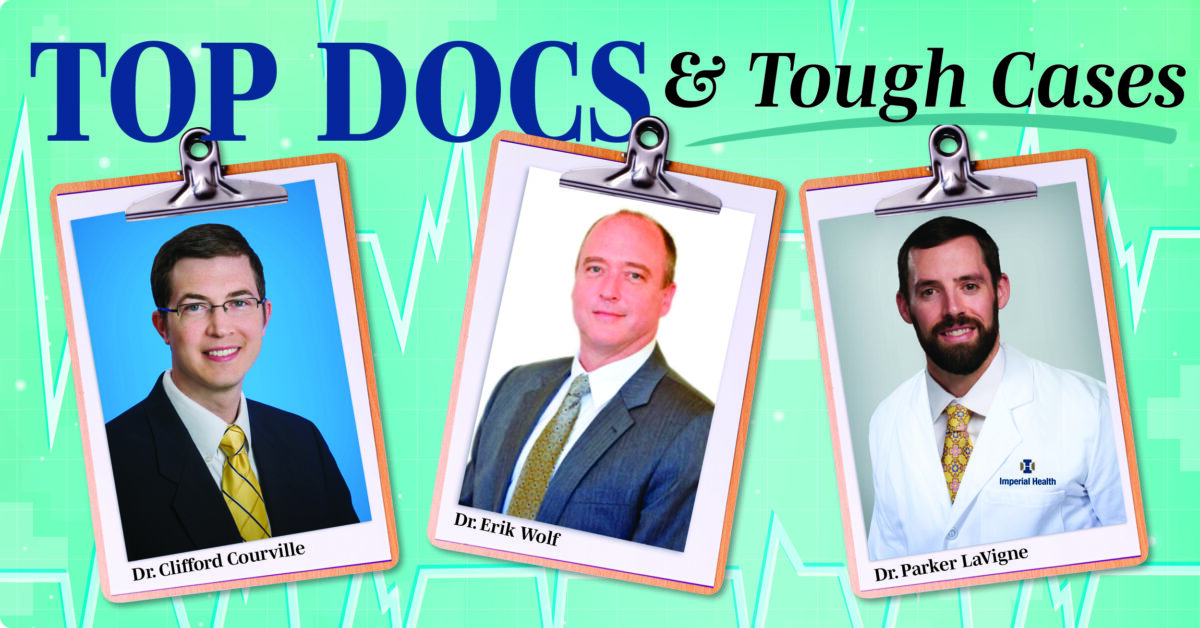
Heart of the Arts in SWLA
September 2024
Lighten Their Load
September 2024Dr. Clifford Courville
Utilizing Technology for Better Lung Cancer Outcomes
Clifford Courville, MD, is a fellowship-trained pulmonologist/critical care physician with Memorial Pulmonary Associates. Motivated by the growing need in the community to diagnose lung cancer earlier, he was the first in Southwest Louisiana to perform a peripheral lung biopsy with robotic-assisted technology, utilizing the Intuitive Ion endoluminal system. His dedication to utilizing advanced technology, such as the Ion, helps him pursue his passion in bringing forth a new era of early-stage lung cancer detection to the community.
Since 2022, Dr. Courville, and the dedicated pulmonary specialists at Lake Charles Memorial Health System have performed over 250 peripheral lung biopsies using the Ion.
Dr. Courville joined Memorial Pulmonology Associates in 2014. His involvement in Memorial’s Committee on Cancer has proven valuable to addressing the growing number of lung cancer diagnoses in SWLA and giving physicians the ability to treat local lung cancer patients sooner than ever before.
“More than half of lung cancer diagnoses are Stage 3 and 4 at which point, the treatment options are limited,” explains Dr. Courville. “On the other hand, a diagnosis of State 1 or 2 could very well be cured, and that’s my hope for my patients.”
Prior to the advancement of using the Ion, the preferred method to reach an abnormal spot in the lung was to use a live CT scan image and a needle, entering the chest wall and lung from outside the body. This method presented a relatively high risk of injury to the lung tissue, potentially causing the lung to collapse for patients who had advanced lung disease.
“The Ion gives me the ability to navigate the natural airways of the lung, with a lower risk of puncturing the lung tissue,” Dr. Courville says. “It’s a safer way to approach the lesions that are in the periphery of the lung for patients who have fairly advanced underlying lung disease.”
Dr. Courville urges those at risk of developing lung cancer to ask their doctor about a lung cancer screening.
“According to the American Lung Association, a lung cancer screening can reduce the risk of death by 20%. This test can literally save your life,” says Dr. Courville.
Additionally, Dr. Courville is a member of the American College of Chest Physicians and the American Thoracic Society. He diagnoses and treats a variety of diseases and conditions of the chest including COPD, pneumonia, asthma, emphysema, lung cancer, critical care and other pulmonary and respiratory conditions.
Dr. Erik Wolf
CHRISTUS Surgeon Recognized For Spinal Cord Expertise
In the world of neurosurgery, unwavering patient care and dedication to advancements in medical treatment have had a profound impact on Dr. Erich Wolf. Esteemed in the Southwest Louisiana region, Dr. Wolf began his journey as a student in biomedical engineering that later led to the field of neurosurgery.
Dr. Wolf’s interest in the specialty began in childhood. At age 11, his parents, unable to secure a sitter, took him to a lecture where a brain was dissected.
“The dissection was digitized and shown on a computer which was able to give 3D images of the brain—a big technical feat at the time,” Dr. Wolf said. “I became enamored with computers and knew neurosurgery was something I wanted to do in the long term.”
After graduating from Tulane University with a Bachelor of Science, master’s and doctorate, he embarked on his professional career in Memphis before making his way to Lake Charles, where he has been essential to CHRISTUS Ochsner St. Patrick Hospital for nearly 25 years.
One of the defining aspects of Dr. Wolf’s career has been his role in using revolutionary surgical techniques, particularly in the treatment of complex spinal conditions.
“Image spine navigation technology can take a CT scan and load the image into the computer system, and we can see on screen where we are operating and it helps us navigate instruments,” Dr. Wolf said.
The precision enabled through this technology is crucial in assisting with complicated surgeries and enhancing surgical outcomes.
Dr. Wolf’s expertise with advanced technology is especially evident in trauma surgery, where he handles challenging cases involving severe spinal injuries, such as broken necks.
One of the most challenging surgeries Dr. Wolf has performed is the transoral odontoidectomy. This detailed procedure involves accessing the odontoid process—the tip of the spine on the second cervical vertebra—through an incision made in the mouth. This technique became necessary for a patient suffering from severe arthritis at the odontoid joint, which was affecting the spinal cord and brainstem, leading to the risk of paralysis.
“We were able to operate and remove bone to decompress the pressure on the spinal cord. It’s one of the most complex surgeries done here at St. Patrick hospital,” Dr. Wolf said.
After a two-week ICU stay and the three months spent in a halo brace, the patient ultimately regained neurological function and returned to a relatively normal life. This outcome is a testament to Dr. Wolf’s skill, the effectiveness of advanced surgical skills, and the importance of comprehensive post-operative care.
Dr. Wolf’s contributions extend beyond individual surgeries. He is the founder of Wavegate Corporation, which offers advanced treatment for chronic pain primarily through spinal cord stimulation. The product can be used by patients or clinicians who are searching for effective pain management. Dr. Wolf hopes to bring his spinal cord stimulation platform to market in 2027.
Dr. Wolf is recognized for not only the technical achievements but also the lasting dedication to the Lake Charles community. His story is a reminder of the ways in which innovation and expertise can intersect to transform lives, affirming the vital role of medical professionals in our society.
Learn more about CHRISTUS Ochsner St. Patrick Hospital at www.christushealth.org/locations/ochsner-st-patrick.
Dr. Parker LaVigne
Preventing a Cardiac Crisis: The Power of Diligent Diagnostic Technology
by Kristy Como Armand
What started out as a routine, non-complicated initial exam soon became a complex interventional cardiology case for Dr. Parker LaVigne, cardiologist with Imperial Health.
As a fellowship trained cardiologist, Dr. LaVigne is experienced in treating serious cardiovascular conditions, but a recent challenging case began with his 70-year-old male patient coming in just to get established with a cardiologist. “The patient came in with no complaints. He just wanted to have an initial exam to establish a relationship with a cardiologist in case he did develop any problems,” says Dr. LaVigne. “Other than slightly elevated blood pressure, cholesterol, and mild diabetes, none of which is surprising in someone over 65, he was in great health and led a very active lifestyle that included regular walking, hunting and fishing.”
As part of his comprehensive initial exam, a coronary calcium score test was performed. Dr. LaVigne explains that this is a low dose CT imaging screening tool that measures the amount of calcium in the arteries. “This patient’s results showed only a moderate plaque burden, just above average for his age group. I didn’t expect to see him again until his next annual appointment, but I was wrong.”
Shortly after he saw Dr. LaVigne, the patient began to experience chest pain during his daily walk. “This man regularly put out and picked up decoys and walked four miles every day, so I knew the pain was not caused by a big change in activity level,” says Dr. LaVigne. “Interestingly, the pain occurred when he was a half mile into his walk, and then stopped as he continued his four-mile route. He was also having chest pain after meals – the same type of pain as he felt when walking. I knew we needed to take a closer look.”
Dr. LaVigne performed a CCTA, or coronary CT angiography. This imaging study uses contrast dye to evaluate blood flow and identify blockages or narrowing in the arteries. “Like the calcium score test, CCTA measures calcification, but it also identifies non-calcified plaque, as well as the severity of stenosis, or narrowing in the arteries,” he explains. “This is a test our group is very skilled in using as an early diagnostic tool for patients with symptoms of coronary artery disease, such as chest pain or breathlessness. It’s one of the very best tools we have for early detection of blockages, allowing us to use medication or interventional treatments to prevent a major cardiac event.”
For this patient, the CCTA identified multiple significant blockages with more than 80% occlusion. “We knew we needed to open up these blockages, but the patient was about to travel to New Zealand,” says Dr. LaVigne. “We brought in other cardiologists in our group to evaluate the test results and all the other factors. The decision was made, after discussion with the patient, to treat his cardiovascular disease with medication while he went on his trip, and then schedule a stent procedure when he returned. He was able to enjoy his trip, including hiking in the mountains of New Zealand without any problems.”
Three stents were placed to restore the patient’s blood flow. Dr. LaVigne said the patient reported no pain a week after the procedure and said he hadn’t felt this good in a long time. He had been feeling progressively more fatigued over the past few months, but attributed this as a natural part of aging and just accepted it. The low energy was actually a symptom of narrowing arteries and the resulting reduced blood flow.
“Fortunately for this patient, he was proactive about his health, exercised regularly, and saw a cardiologist before he even had problems,” says Dr. LaVigne. “Then, when he had pain, he came in to get it checked out. This allowed us to use the advanced technology we have to diagnose and treat his blockages with minimally invasive procedures that improved his overall health and quality of life. Today, this patient walks four-to-six miles a day and continues to travel and enjoy an active life. This is a great case study in how to take care of your heart.”
Dr. LaVigne’s office is located in Imperial Health’s main office at 501 Dr. Michael DeBakey Drive in Lake Charles. Call (337) 312-8181 to schedule an appointment.






